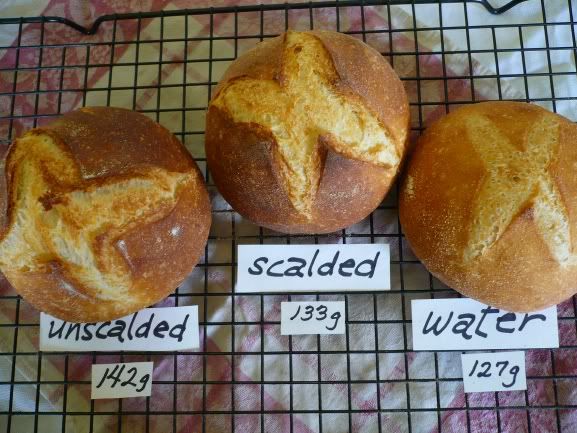The various and opposing lines of thought, not just here but in reputable books and on line as well, on scalding milk for bread have me baffled and scratchin' my head. Especially as I've been blithely adding unscalded milk to my doughs for, well, a very long time. Had I really been compromising my results with careless technique? Spurred on by CountryBoy's recent thread, yesterday I did this:

I tried to control the variables with limited success, but all three cute little buns were mixed with roughly 70g liquid, 95g KA AP, 2g salt and 1g ADY. 5 minute knead, 1 hour ferment, 1/2 hour proof. Into a 450* oven on a sheet pan covered by a rinsed stainless bowl, and baked for 25 minutes. The unscalded gets the blue ribbon but it also had the advantage of being a touch heavier and baked last so the oven was I assume at its hottest. Still. Clearly it didn't suffer from lack of scalding. My conclusion?
I need to get a life.
And I would be interested to know what others' experience has been.
(We ate two of these for dinner, reheated with garlic butter. It was worth it to further the cause of science.)
I will take any or all of them if you are expressing disappointment. I'm somewhat discerning, but not picky. If anything I baked didn't come out with at least that much variation I would be surprised.
Lee
:D
So I'm nevah gonna scald my milk again!!!
Gorgeous bread and sounds even more terrific with the garlic buttah! :D
Hi, Mini. You're questioning my empiricality?!
I used active dry, but I'm not sure that detail affects the point you're making. And that's a whole 'nother can of worms I didn't consider, hm indeed. Perhaps this whole issue about scading or not is only relevant with extended rises? My sourdough results are not consistent enough for me to tackle that experiment.
TRK, did Cooks Illustrated address long rise times, or did they stick with dry yeast and an hour or two? There's an article I'd like to see, no fudging science for that crowd.
Thanks, BZ dear. There's one left, but I promised it to Lee.
Okay, this is what I did instead of working...a little on line research that yielded yet another generous crop of oppositional assertions about milk and bread. I copied this because I liked it (especially the little pink FALSE stamp. So dramatic.):
I could bring in another dozen articles citing exactly otherwise. Not to mention the fact that I have boatloads of respect for Cooks Illustrated and am inclined to believe almost everything they say.
Do I think this, or my own version of Science Lab Amateur Hour, prove anything definitively? Nope. And as soon as a loaf with a cup or two of unscalded milk in it turns out coarse and low, you know what I'll blame.
Maybe I should make us one? :D
Good job browndog! So when are you starting the trial with the sourdough :D hahahaha! You could of course, in the cause of science send me one of them to try ;)